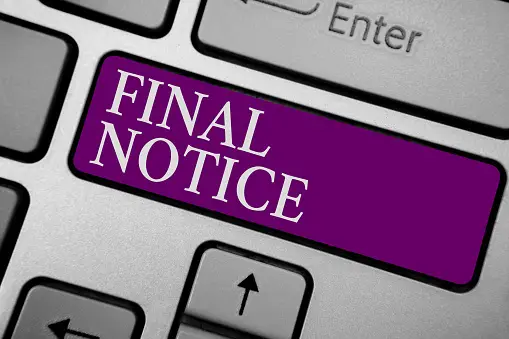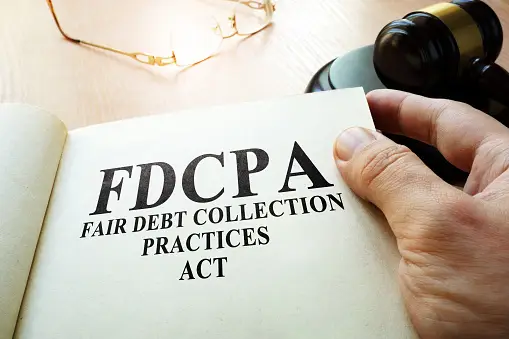You are now leaving the Bright website and entering a third-party website. Bright has no control over the content, products, or services offered, nor the security or privacy of information transmitted to others via their website. We recommend that you review the privacy policy of the site you are entering. Bright does not guarantee or endorse the products, information, or recommendations provided on any third-party website.
Did you know that about 15% of Americans have said that they had been sued by a debt collector, according to a 2017 report by the Consumer Financial Protection Bureau? Dealing with debt collectors can be a daunting and stressful experience. If you find yourself in a situation where debt collectors have taken legal action and sued you, it's essential to know your rights and take the appropriate steps to protect yourself.
Before we dive into more about the topic, you need to read about the current Debt Ceiling and the Latest Developments in 2023 by Bright Money to get a better grasp of the concept.
This guide will walk you through the process of handling a debt collection lawsuit efficiently and effectively.

What are Debt Collection Lawsuits?
If you owe creditors money and fall behind on payments, the creditor may elect to turn over your account to a debt collection agency. Debt collectors are in charge of retrieving the unpaid sum, and they could take legal action, like bringing a lawsuit, to do so. A formal legal procedure known as a debt collection lawsuit allows the creditor to ask the court for a judgment compelling the debtor to pay the obligation.
1. Understanding the Summons and Complaints
Let's understand this with the help of an example. Alex, who is facing financial difficulties due to medical bills, falls behind on credit card payments. The credit card company initiates a debt collection lawsuit.
1. Summons and Complaint: The process begins with a summons and complaint served by the court, informing Alex of the lawsuit, the court details, the response deadline, and the owed amount.
2. Response: Alex can either not respond (common in 70% of cases, leading to default judgments) or file an "Answer" to admit/deny claims.
3. Default Judgment: Failure to respond risks a default judgment in favor of the credit card company, resulting in potential debt payment enforcement.
2. Responding to the Lawsuit
Ignoring a lawsuit is one of the worst mistakes you can make. If you fail to respond within the given timeframe (usually 20-30 days), the court may issue a default judgment in the creditor's favor. To respond to the lawsuit:
- Analyze the Complaint
Alex needs to read and understand the complaint carefully. He’ll need to identify any discrepancies or inaccuracies in the claim made by the plaintiff. It's crucial to pay attention to the debt amount, creditor information, and any relevant dates.
- Seek Legal Advice
Alex will also need to consult a lawyer with experience in debt-collecting proceedings if he’s unclear on how to respond or defend himself in court. An experienced attorney can help him through the court procedure, defend his rights, and aid in the development of a compelling defense.
- File Your Response
Alex will have to prepare and file his response with the court before the deadline. In his response, he’ll need to address each point made in the complaint and assert any applicable defenses he may have. Admitting or denying the allegations with supporting evidence can strengthen his position.

3. Defenses Against Debt Collection Lawsuits
According to a survey by The Pew Charitable Trust, debt collection litigation have increased significantly. Debt claims made up 1 in 4 civil lawsuits in 2013 compared to 1 in 9 civil cases in 1993, 20 years later. Alex can use several valid defenses to challenge a debt collection lawsuit. Some common defenses include:
- Statute of Limitations
The statute of limitations, which starts counting from the date of the last action taken to collect the debt, dictates how long debt collectors have to pursue cases. Alex can use this as a defense if the debt is past the statute of limitations.
- Identity Theft
If Alex believes that the debt is not his or was a result of identity theft, he’ll have the right to dispute the claim and provide evidence supporting his position.
- Lack of Proper Documentation
Debt collectors must provide sufficient documentation to prove that they have the legal right to collect the debt. If they fail to do so, Alex can challenge the validity of the claim.
4. Attending the Court Hearing
If Alex submits a timely and valid response to the lawsuit, the court will schedule a hearing to review the case. Here's what Alex should do in preparation for the court hearing:
- Organize Your Documents
Gather all relevant documents, including the original debt agreement, payment history, correspondence with the creditor or debt collector, and any evidence supporting Alex’s defenses.
- Dress Appropriately
Alex should dress professionally when attending the court hearing. This shows respect for the legal process and can positively influence the judge's perception of Alex.
- Present Your Case
During the hearing, Alex needs to present his case clearly and confidently. He’ll also need to stick to the facts and refer to his documented evidence when making his points.
- Be Respectful
Alex must remain respectful and composed throughout the court proceedings, regardless of the outcome, and avoid emotional outbursts, as they can harm his credibility.
5. Possible Outcomes of the Court Hearing
The court hearing will lead to various potential outcomes:
- Judgment in Your Favor
If the court finds in Alex’s favor or the debt collector fails to appear, the case may be dismissed, and Alex won't be held liable for the debt.
- Judgment in Favor of the Debt Collector
If the court rules in favor of the debt collector, a judgment will be entered against Alex. The court may order wage garnishment or other collection methods.
- Settlement
In some cases, a settlement may be reached between Alex and the debt collector. This agreement may involve a reduced lump-sum payment or a structured repayment plan.
6. Appealing the Court Decision
Alex might be able to appeal the court's ruling if he dosen’t agree with it. He can ask a higher court to assess the case and decide whether there were any legal mistakes made during the original hearing by filing an appeal.
Alternatives to Lawsuits
When faced with unpaid debts, creditors and debt collectors often consider legal action as a last resort. However, pursuing debt collection lawsuits can be time-consuming, expensive, and may not always yield the desired results. Fortunately, there are alternatives to debt collection lawsuits that can help creditors and debtors find mutually beneficial solutions and resolve debts without resorting to the courts.
Here are some of the alternatives to debt collection lawsuits:
1. Negotiating Payment Plans or Settlements
One effective alternative is to negotiate payment plans or settlements with the debtor directly. This involves open and honest communication to reach an agreement that’s acceptable to both parties. Creditors can consider offering reduced payment amounts, extended repayment terms, or lump-sum settlement options to incentivize debtors to fulfill their obligations. Negotiating payment plans or settlements can often lead to faster debt resolution and preserve the creditor-debtor relationship.
2. Mediation
In mediation, a third person who is impartial is brought in to help the parties communicate. The mediator promotes compromise, facilitates conversation, and helps parties arrive at solutions that are acceptable to both parties. Through mediation, both parties may voice their issues, consider potential solutions, and move toward a conclusion. It is a voluntary method that fosters a more peaceful outcome while reducing the time and expense of court processes.
In mediation, parties retain control over the outcome and terms of the agreement, whereas, in arbitration, parties surrender more control over the decision-making process.
3. Debt Management Plans
A debt management plan (DMP) can be a viable option for individuals struggling with multiple debts. A DMP involves creating a structured repayment plan with a credit counseling agency like the Bright Money App. The agency negotiates with creditors on behalf of the debtor to reduce interest rates, waive fees, and establish affordable monthly payments. Debt management plans provide a consolidated approach to debt repayment like a debt consolidation loan, making it easier for debtors to manage their obligations and fulfill their financial commitments.
4. Debt Settlement Companies
Debt settlement companies specialize in negotiating with creditors on behalf of debtors to reduce the overall debt amount. These companies typically require debtors to make monthly payments into a settlement fund, which is then used to negotiate lump-sum settlements with creditors. While debt settlement companies can help debtors reduce their outstanding balances, it's essential to carefully evaluate the legitimacy and credibility of such companies to avoid potential scams or negative financial consequences.
5. Forbearance or Repayment Arrangements
For creditors, offering forbearance or repayment arrangements can be an effective alternative to debt collection lawsuits. Forbearance involves temporarily suspending or reducing debt payments due to financial hardship.
6. Enlisting the Services of Collection Agencies
Collection agencies specialize in collecting debts on behalf of creditors. Instead of resorting to legal action, creditors can engage collection agencies to recover the outstanding debts.
7. Arbitration
Arbitration is a formal alternative dispute resolution process where an arbitrator, a neutral third party, reviews the evidence and makes a binding decision to resolve the dispute. It offers a more streamlined and cost-effective approach compared to litigation. Arbitration can efficiently resolve debt disputes when both parties agree to abide by the arbitrator's decision.
In arbitration, parties surrender more control over the decision-making process whereas, in mediation, parties retain control over the outcome and terms of the agreement.

Conclusion
Facing a debt collection lawsuit can be stressful, but understanding the process and your rights can make a significant difference. Remember to respond to the lawsuit promptly, explore valid defenses, and seek legal counsel when necessary. Appealing the court's decision is also an option if you believe the ruling was unjust.
By being proactive and informed, you can navigate the complexities of debt collection lawsuits with confidence. Always prioritize resolving your debts, whether through negotiation, settlement, or repayment plans, to avoid further legal actions.
With proper knowledge and preparation, you can take control of debt collection lawsuits and move toward a more secure financial future.
Recommended Reads: How many credit cards should I have?
FAQs
- Can I ignore a debt collection lawsuit?
A: Ignoring a debt collection lawsuit can result in a default judgment against you. It's essential to respond promptly and appropriately.
- Do I need an attorney for a debt collection lawsuit?
A: While it's not required, having an attorney can significantly improve your chances of mounting a successful defense.
- What happens if I win the lawsuit?
A: If you win, the debt collector cannot pursue the debt further through legal means.
- Can I negotiate a settlement with the debt collector?
A: Yes, you can negotiate a settlement to resolve the debt on mutually agreed terms.
- How long does a debt collection lawsuit take?
A: The duration of a debt collection lawsuit can vary depending on factors like court backlog and complexity.
- Can debt collectors sue you?
A: Yes, debt collectors can sue you to recover unpaid debts.



